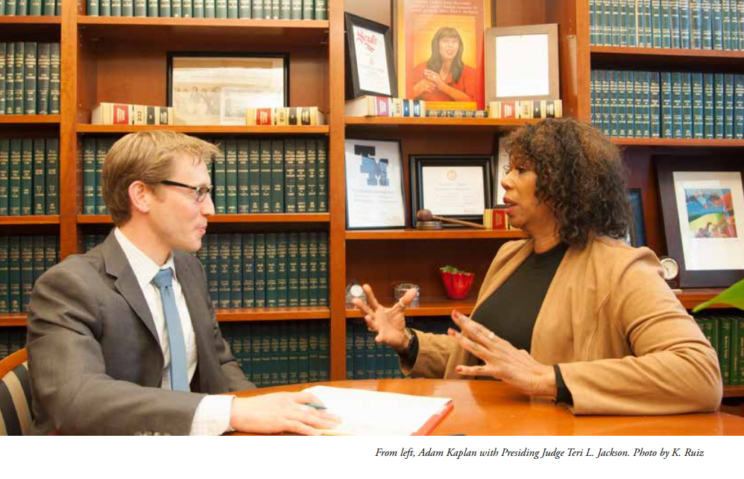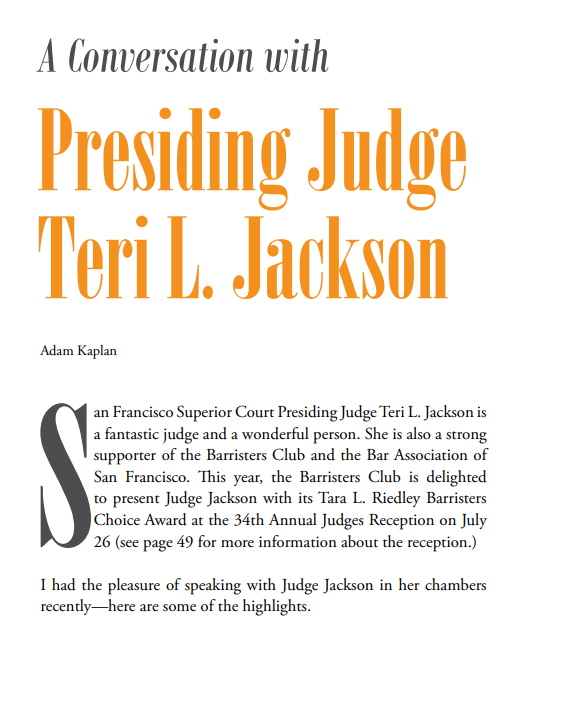
San Francisco Superior Court Presiding Judge Teri L. Jackson is a fantastic judge and a wonderful person. She is also a strong supporter of the Barristers Club and the Bar Association of San Francisco. This year, the Barristers Club is delighted to present Judge Jackson with its Tara L. Riedley Barristers Choice Award at the 34th Annual Judges Reception on July 26.
I had the pleasure of speaking with Judge Jackson in her chambers recently—here are some of the highlights.
What was it like growing up in the Bay Area?
I love the Bay Area. I’m a first-generation San Franciscan, and so is my sister. My parents are from Louisiana. I went back east to go to law school, but after law school, I wanted to come back here. The reality is, we were dealing with the same issues that plagued our country at [that time] and still do, today: Discrimination, integration, dealing with racial tensions. The same things that were happening nationally were happening here. It was just not as overt.
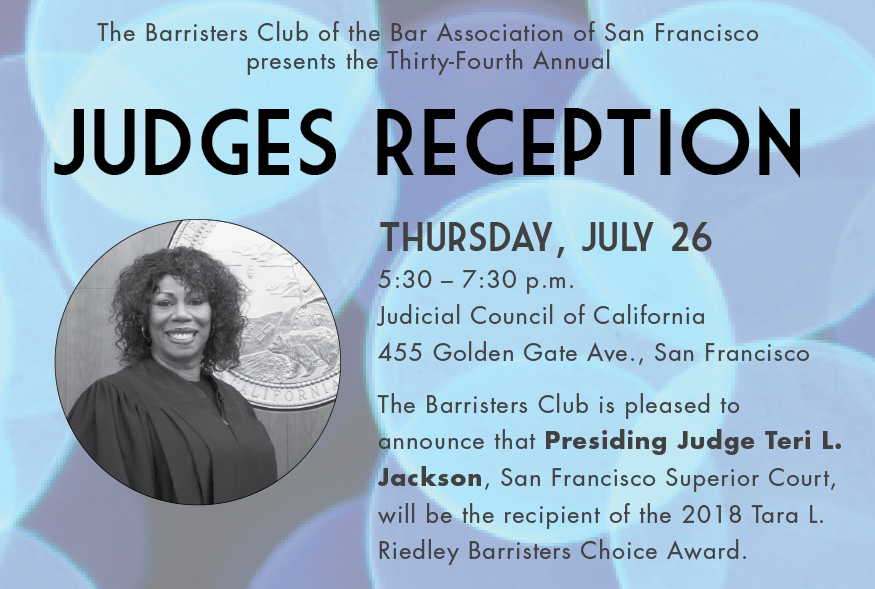
 
I understand there were some issues when your family bought a house in Daly City?
We were the first African American family in this particular neighborhood and my sister and I integrated the school we went to. And it was not easy. Back in those days, if you were African American and you wanted to live in a neighborhood that was all white, you had to hire someone to be ‘Mr. and Mrs. Jackson.’ The realtor hired a couple to pose as my parents, and my parents bought the house without really seeing it until we moved in.
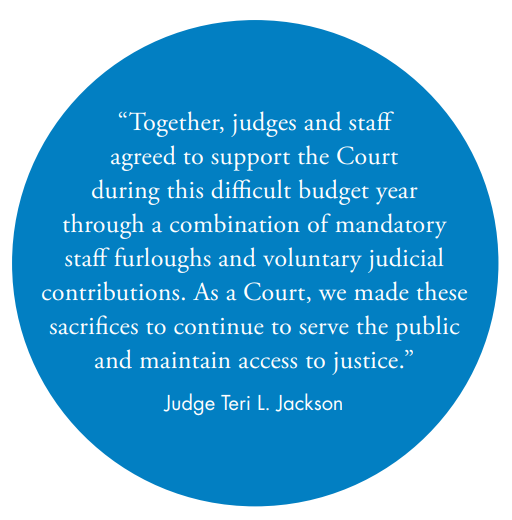 When the people realized that they had sold to an African American family, they tried every which way to get out of the deal. Then a group of neighbors tried to come up with the funds to buy us out. My father worked at night and my mom worked during the day, and they were very frightened because they had two little girls. I think I was four years old and [my sister] Portia was eight. My mom had a shotgun out of fear that people would use some form of violence against African American homes. For a long time, we all slept in the same bed. If they should firebomb, if they should start shooting, my mom wanted to be able to get to her children quickly so we could escape. That’s how we grew up.
When the people realized that they had sold to an African American family, they tried every which way to get out of the deal. Then a group of neighbors tried to come up with the funds to buy us out. My father worked at night and my mom worked during the day, and they were very frightened because they had two little girls. I think I was four years old and [my sister] Portia was eight. My mom had a shotgun out of fear that people would use some form of violence against African American homes. For a long time, we all slept in the same bed. If they should firebomb, if they should start shooting, my mom wanted to be able to get to her children quickly so we could escape. That’s how we grew up.
Over the years, it turned out these very neighbors became my parents’ best friends. They celebrated every milestone of my family-graduations, birthdays and weddings.
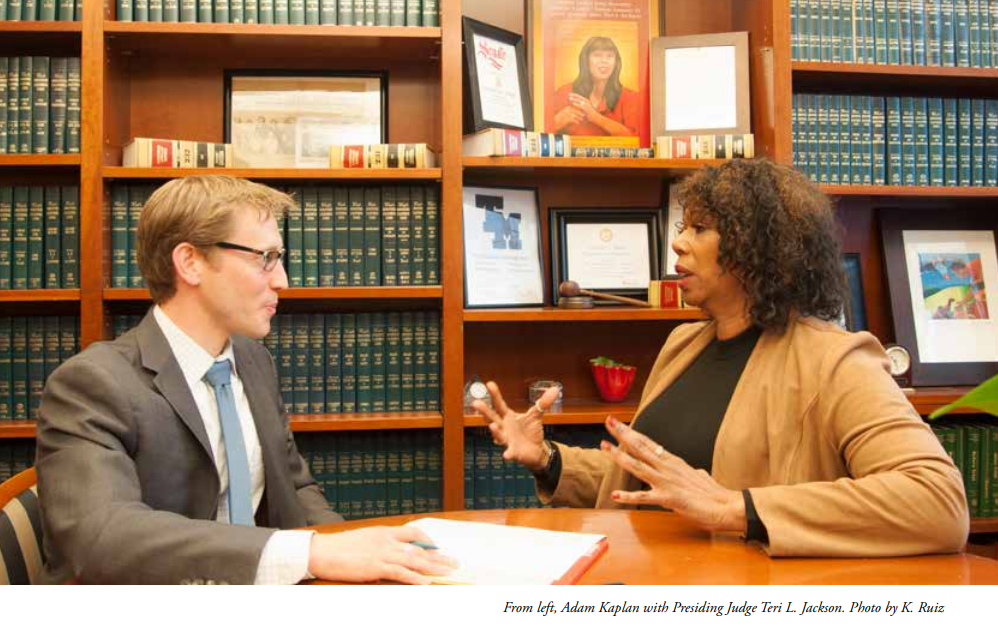
When you were a kid, what did you want to be when you grew up?
I wanted to be a lawyer; I knew that from when I was five years old. Portia was supposed to be the lawyer, though. My father, before going to World War II, read The Merchant of Venice, and Portia was the lawyer [in the play]. His attitude—and he was in one of the few ‘Negro’ combat divisions sent to North Africa, and that’s a story in of itself—but his attitude was that ‘if I ever survive this, I’m going back to marry the homecoming queen in Jonesboro Lodge, Louisiana (my mother) and move to California’ because he’d heard stories about San Francisco. And my dad said that if he ever had a daughter, he was going to name her Portia and she was going to be lawyer. That’s how my sister got her name. I’m named after my sister’s imaginary friend, ‘Gerri.’
So they did everything possible to make Portia the “Perry Mason.” They took us to the movie To Kill a Mockingbird when it came out, and they thought, ‘Teri will fall asleep and Portia will realize her destiny and become the lawyer.’ She fell asleep, I watched the movie, and I walked out and said I wanted to be like Atticus Finch and I want to do what’s right, not what’s popular.
Have any aspects of being a judge surprised you?
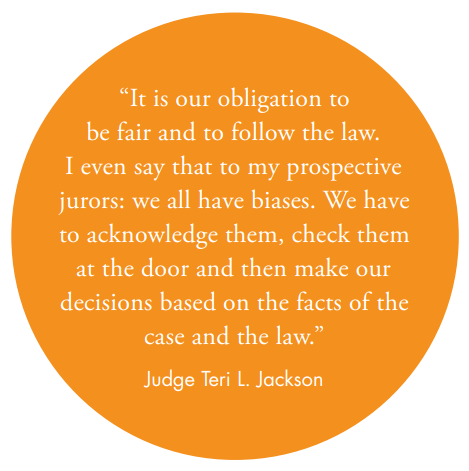 One thing that people don’t realize is the lack of power-you think that judges wield a lot of power. We don’t. There are limitations, and even if you have personal feelings, it is our job to put these views aside to make sure that both sides can be heard and my rulings are based in the law. I now tell the attorneys that they are the most powerful people in the courtroom next to the court reporter and possibly the clerk. Because they know the case, they know how to advocate.
One thing that people don’t realize is the lack of power-you think that judges wield a lot of power. We don’t. There are limitations, and even if you have personal feelings, it is our job to put these views aside to make sure that both sides can be heard and my rulings are based in the law. I now tell the attorneys that they are the most powerful people in the courtroom next to the court reporter and possibly the clerk. Because they know the case, they know how to advocate.
We all want to be fair, but, being a judge, you’re testing your fairness not every once in a while, but every day you walk into the courtroom. However, it is our obligation to be fair and to follow the law. I even say that to my prospective jurors: we all have biases. We have to acknowledge them, check them at the door and then make our decisions based on the facts of the case and the law.
Has anything surprised you about the role of the presiding judge?
As a presiding judge, you get to know everyone and how they keep our court running, and I’ve been very impressed with our staff. They really know what they’re doing. I’m not surprised; I’m just impressed with their expertise and dedication. They really have the best interest in making our court work and making it work well. And then my colleagues have been wonderful.
This has been a very difficult year, because our court took close to a ten percent cut. But it’s been great to see the court rally to support one another. Together, judges and staff agreed to support the Court during this difficult budget year through a combination of mandatory staff furloughs and voluntary judicial contributions. As a Court, we made these sacrifices to continue to serve the public and maintain access to justice.
You teach law school as well. How do you manage that with your caseload and administrative work?
After a full day in court, I have to get a second wind to teach at night for three hours. But once I’m in the classroom, I become re-energized and fully engaged with my students. Sometimes I lose track of time as we exchange ideas, discuss legal concepts, cases and strategy. We learn from each other. After a recent class, I realized when I got in my car, I kept them 45 minutes longer than I should have! But I love it. And you know, when I grow up, that’s what I hope to do.
Is there a piece of advice that you give to your students and that you wish the advocates who appear before you always followed?
Prepare, prepare, prepare. I do not know your brief, I do not know your case as well as you do. And what is amazing sometimes, there is someone at the firm who’s writing the brief, and someone else comes in to argue the brief. You got to read the brief. Because I’m reading it. And you have to understand it and appreciate it.
I understand that you go on trips to interesting and different places when you can?
I’m trying to, because I’ve overworked myself. Portia and I are trying to go off on a trip every year. The year before last we went off to Italy together. I picked the trip for the first time. A friend of mine encouraged me to go with his group to Italy. I didn’t bother to read what it was about. I just heard Italy, we’re going to be there for three weeks, and then we’re going to be on Capri, and I just said, ‘sign me up.’
She didn’t read the itinerary, I didn’t read it. And then we show up, and at 7 a.m., we had to meet down in the lobby with the rest of the people. And there comes a priest. And Portia and I are looking at each other, because we had been thinking, ‘we’re going to be in piazzas drinking wine,’ and in comes the priest and says, ‘welcome to the pilgrimage of Francis of Assisi.’ And I’m like, ‘Assisi?’ And my sister is like, ‘why didn’t you read the itinerary?!’ So we did this pilgrimage for two weeks going to every place Francis of Assisi had trekked. It turned out we got a chance to attend a Mass with the Pope. It was really fun.
Did you get to meet the Pope?
Not the Pope, but his representative. He came over to my sister. And this I will never forget: he came to us and said, ‘the Pope wanted me to convey how proud he is of [Portia’s son], Jason Collins, for the courage of being the first [active] NBA player to come out as gay.
About Jason – I read that you were one of the first people in the family that he came out to, is that right?
Well I knew, and he knew I knew. And we always did that dance. I just wanted to be there for him. And when he finally decided to come out, he came to me. And he was in the midst of contract negotiations, so ever the lawyer, [I said] well let me go over this contract with you. And he said, ‘Auntie did you hear?’ And I said, ‘yes I heard. I know you’re gay. I’ve known you were gay since you were a little boy. And I’m proud that you could come out.’ I’m very honored that he trusted me enough and I was there for him.
Finally, I heard from an inside source that you have a dog that you treat like a person.
Why? Is it because I put the Burberry raincoat on him? Or is it the polish on his feet? Cooper is from the SPCA. He rescued me. He gets me away from work. He makes me laugh. He is a character—it’s all about him. And so I just enjoy him a great deal.
Does Cooper ever get to come to court?
Only when I come in on weekends, he comes with me.
How does he like it here?
Oh, any place he can be the boss…
Adam Kaplan is a litigator in the San Francisco office of Munger, Tolles & Olson, and is the immediate past president of the Barristers Club. His practice focuses on complex commercial litigation, with an emphasis on securities, intellectual property and employment litigation.


